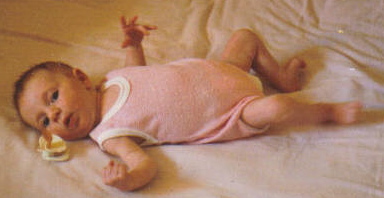publication date: May 2, 2007

Babies
love sucking and it is one of the first ways they can
comfort themselves either by using a
thumb,
finger or a
dummy, if provided.
The
use of dummies for babies and young children is a
controversial issue - you either
loathe the sight of them or you wouldn’t
be without one.
While most baby books
advise against their use, many a
seasoned parent will admit that for very
miserable or fretful babies, a dummy can be a
life-line. What you have to
guard against is the habit of popping a dummy into a baby’s mouth whenever
he cries without first trying to find out what
he needs; he may need
feeding, changing or a
hug.
The
main advantage for using a dummy is that it will often
soothe a fretful baby to sleep. However, if it then falls out of his mouth he may
wake and cry for it and while the baby is young you have to be scrupulous about
sterilising dummies.
Before a baby reaches
six months you can introduce a dummy and then take it away without him missing it but after six months a baby will know that his dummy brings him comfort and may not be happy to
relinquish it.
However as your baby grows older he will
explore the world by
putting things in his mouth, this is a stage he goes through which develops his
hand-eye coordination, so you won’t want his mouth permanently engaged with a dummy.
As your toddler utters his
first words, the sounds may be muffled by a dummy in his mouth, which, if in constant use, may lead to problems with
pronunciation or
delayed speech.
Many parents worry that a dummy will affect an
infant’s teeth.
Dentist and member of the British Dental Association’s Health and Science Committee, Gordon Watkins is reassuring: “ If the child is weaned off the dummy before the
age of four, there is less chance of any
ill effects on
second teeth. The main thing is not to worry about it. Research has shown that children of parents who get hung up about the use of a dummy,
keep it longer! And children who have dummies give them up earlier than children give up
sucking their thumbs!”
Try to
wean your child off sucking its thumb or a dummy, treating it as part of the
growing up process. Many parents have found that offering to
replace the dummy with a new toy or some small surprise is a good way for children to make the
final goodbye.
Parental tips
Don’t:
- Use a dummy with a reservoir or if you do only fill it with water.
- Dip dummies in honey or sweet things.
- Have a dummy on a ribbon round the neck as it may strangle the baby.
- Encourage your infant to suck every time he’s upset, explore other ways to calm him.